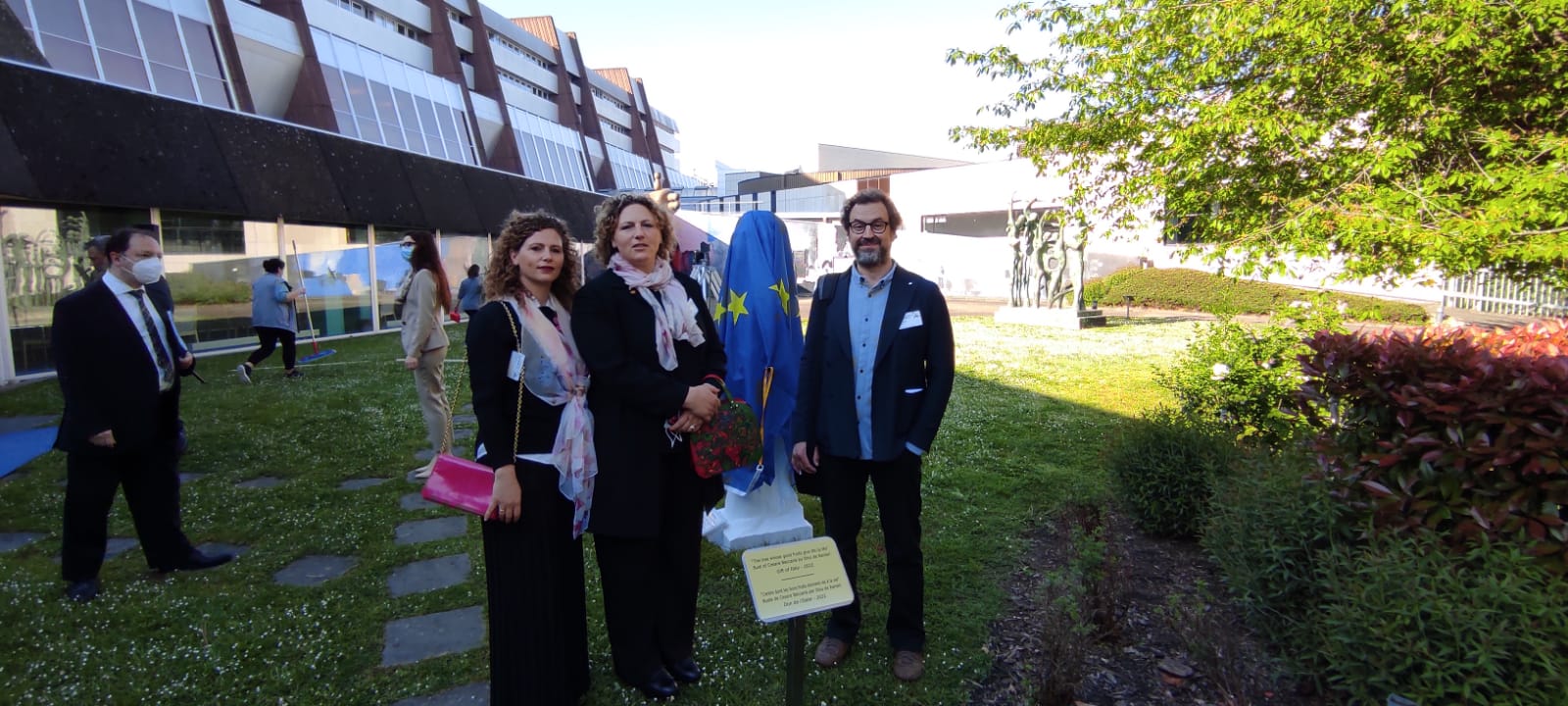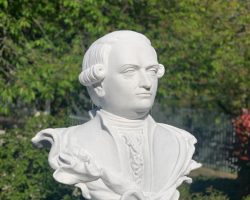Cesare Beccaria
Bust donated to the COUNCIL OF EUROPE (strasbourg)
PERSONAGE
CESARE BECCARIA
Philosopher, jurist, economist, and writer of the 18th century Italy, Cesare Beccaria was a key figure of the Enlightenment. His influence was crucial in shaping the principles of modern criminology and a penal law based on rationality, guarantee of rights, and equality. Educated at the Accademia dei Pugni in Milan, Beccaria collaborated with the magazine Il Caffè, a reference point for the spread of Enlightenment ideas in Italy, founded by the brothers Pietro and Alessandro Verri. Through this collaboration, Beccaria committed himself to promoting the importance of culture and its dissemination as a fundamental tool for social and intellectual progress.
DEI DELITTI E DELLE PENE
Cesare Beccaria's major work, "Dei delitti e delle pene" (On Crimes and Punishments), published in 1764, critically examines the legal practices of his time, highlighting the flaws in the justice system that hindered its fair operation. The work was highly successful and was translated into French, English, Spanish, German, and Russian. However, it also faced criticism and was placed on the Index of Prohibited Books in 1766 for introducing the distinction between Crime and Sin as operating in two separate systems. According to Beccaria, a crime is a violation of the pact that the individual has with other members of society, while sin operates purely on a metaphysical level and will be subject to divine judgment.
“If I can prove that the death penalty is neither useful nor necessary, I will have won the cause of humanity"
Beccaria's revolution lies in the proposal for a complete reform of justice, particularly in the connection between crimes and punishments. Among his proposals is the call for the abolition of torture, seen as a widespread and rights-infringing inquisitorial practice. He also criticizes the use of the death penalty as a tool of the state, arguing that it itself constitutes a crime against the individual and does not allow for the rehabilitation of the guilty party.
TIDBIT
Leopoldine Code
The first state in the world to abolish the death penalty was the Grand Duchy of Tuscany on November 30, 1786. The first enlightened sovereign to follow Beccaria's work was Grand Duke Pietro Leopoldo, who issued the "Reform of Tuscan Criminal Legislation" or "Leopoldine Code," which, among other things, abolished the crimes of torture and lese-majesty.
Alessandro Manzoni's grandfather
Cesare Beccaria was the maternal grandfather of Alessandro Manzoni, the famous Italian writer, and author of the novel "I Promessi Sposi" ("The Betrothed"), a foundational work of Italian romantic literature in which the theme of injustice and the use of violence as a tool of dominance is raised through the vicissitudes of the protagonists.
The printing of the Encyclopédie
Beccaria penned the work at the young age of 26, between March 1763 and January of the following year. The book was then printed in July 1764 in Livorno by the publishing house of Marco Coltellini, a poet and entrepreneur who in 1762 acquired the then-famous Livorno printing press "All'Insegna della Verità," giving it new impetus under the skilled direction of the French-born typographer and publisher Giuseppe Aubert. Within just 18 months, six more editions were published. The Livorno publishing house became a point of reference for the entire Milanese Enlightenment group, eventually managing the complete reprinting of the 39 volumes of the Encyclopédie (by Diderot and D'Alembert).
BUSTS
The Romualdo Del Bianco Foundation
Established in the 1990s in Florence through the vision of an enlightened entrepreneur, its primary goal is to facilitate meetings and cultural exchanges among young people from different cultures and countries. The Foundation's motto, "For peace in the world, among young people from different countries, through Culture, meeting, knowing each other, understanding each other to develop friendship among peoples," reflects its commitment to promoting intercultural understanding and friendship between nations. The Foundation actively promotes respect for the diversity of cultural expressions and works to develop friendships between people through a series of international initiatives. These meetings preferably take place in cultural venues or heritage sites, highlighting the importance of culture in building bridges between communities. The Romualdo Del Bianco Foundation operates on a non-profit basis, dedicating itself to the promotion and implementation of projects, research, publications, awards, and scholarships that promote dialogue between cultures. Its commitment to the "Heritage for Dialogue between Cultures" is reflected in its activities and programs, aiming to create a more inclusive and supportive world through culture and education.
Donation to the Council of Europe
The Foundation commissioned the creation of a Carrara marble bust depicting the renowned jurist Cesare Beccaria, donating it to the Italian Ministry of Foreign Affairs during the Italian Presidency of the Committee of Ministers of the Council of Europe (November 2021-May 2022), which in turn donated it to the Council of Europe. This choice is not random but reflects a connection between Beccaria's ideas and the key objectives of the Council of Europe, such as the prevention of torture and the abolition of the death penalty. It is a deliberate tribute to a prominent Italian figure whose ideas influenced the politics of his time and anticipated the fundamental values of modern international conventions.
The busts in the world
Through the generous donation of Carrara white marble busts, the Romualdo Del Bianco Foundation has not only deepened bonds of friendship and collaboration with numerous Italian and international institutions but has also celebrated the intrinsic value of exquisite Italian art by immortalizing select figures from our World Heritage.
Leonardo Da Vinci stands proudly in exhibitions across Tbilisi (Georgia), Baku (Azerbaijan), Florence (Italy), Yerevan (Armenia), Almaty (Kazakhstan), Bishkek (Kyrgyzstan), and Wisconsin (United States); Galileo Galilei's likeness graces galleries in Florence (Italy), Kyoto (japan), Krakow (Poland), Rabat (Morocco), and Benevento (Italy); Michelangelo's visage adorns spaces in Florence (Italy), Warsaw , Krakow (Poland), Manama (Bahrain), and Chisinau (Moldova); Dante's essence captivates audiences in Florence (Italy); while Cesare Beccaria's legacy finds a deserving home in the heart of Strasbourg (France).
Leonardo Da Vinci stands proudly in exhibitions across Tbilisi (Georgia), Baku (Azerbaijan), Florence (Italy), Yerevan (Armenia), Almaty (Kazakhstan), Bishkek (Kyrgyzstan), and Wisconsin (United States); Galileo Galilei's likeness graces galleries in Florence (Italy), Kyoto (japan), Krakow (Poland), Rabat (Morocco), and Benevento (Italy); Michelangelo's visage adorns spaces in Florence (Italy), Warsaw , Krakow (Poland), Manama (Bahrain), and Chisinau (Moldova); Dante's essence captivates audiences in Florence (Italy); while Cesare Beccaria's legacy finds a deserving home in the heart of Strasbourg (France).
THE WORK
The bust and its author
"Cesare Beccaria - The tree whose good fruits give life to life" is a sculpture by Dino De Ranieri from Pietrasanta, crafted in fine Carrara white marble sourced from the Michelangelo Quarry in the Apuan Alps of Tuscany. The bust, weighing approximately 300 kg and measuring around 90x64x40 cm, sits atop a base measuring about 105x55x55 cm, weighing 400 kg. Here are his words on the artwork: "The tree of life is a symbol of birth and rebirth. It represents a new life or a new phase of one's existence. Respect and love for others. The roots, to be firmly anchored, must go deep. The trunk is solid, resisting and supporting the weight of the branches. Beccaria, in our case, is the 'crown' and the 'good fruit' of the tree that 'has given birth to life'."
Italy's Advocacy for the Abolition of the Death Penalty
Italy plays a highly active role in the international campaign against the death penalty, both in terms of negotiations and awareness-raising actions. The first resolution for a universal moratorium on the use of the death penalty at the United Nations General Assembly was introduced by Italy in 2007, driven by strong impetus from Italian civil society, and was approved with 104 votes in favor. Since 2008, the initiative has been presented biennially. In 2020, also thanks to Italy's leading contribution, the Resolution was adopted with a record number of favorable votes: 123 in favor, 24 abstentions, and 38 opposing votes. The Italian civil society has always been highly active in the international campaign for the resolution on the moratorium of capital executions. In December 2014, the Ministry of Foreign Affairs established a Task Force on the death penalty to coordinate respective awareness-raising activities.
GALLERY

Busto
Laboratorio a Pietrasanta (LU)

Consegna
Carlotta e Caterina Del Bianco con Dino De Ranieri

Busto
Laboratorio Pietrasanta (LU)

Consegna
Consiglio d'Europa - Strasburgo


